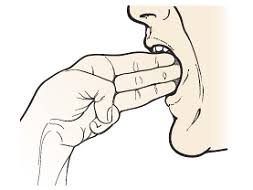Oral Treatment For Respective Mouth Diseases
Mouth Ulcers
Mouth ulcers or canker sores are superficial lesions that appear in the soft tissues of the mouth. Mouth ulcers usually appear in the tongue, gums, and inner lips and look like red or yellow. Mouth sores may be unilateral or bilateral and may appear on one or both sides of your mouth. They can be painful and cause problems when speaking and drinking. Deep mouth sores found in the throat also make it difficult to swallow anything.
Treatment is must for incurable mouth sores because most of them disappear on their own after a few days. Oral Rinse Medicine For Mouth Ulcers is the recommended medications for the diagnosis of painful mouth sores. Canker sores may erupt because of trauma, hormonal changes, iron deficiencies, vitamin deficiencies, and even genetic factors.
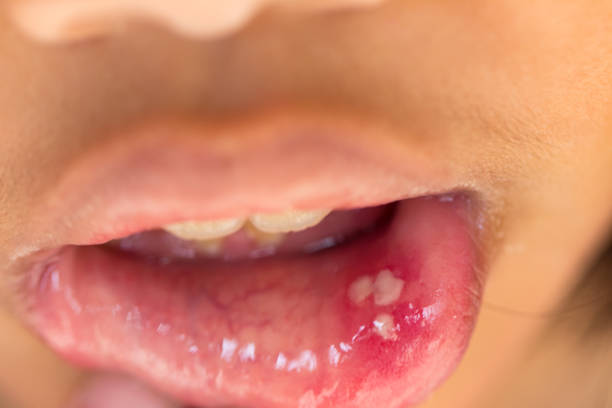
The cases of Mouth ulcers are feasible in women, adolescents, and people with a family history to have canker sores. The disease is not infectious and generally cured within a week or two. However Major mouth ulcers are extremely painful and need medical attention for treatment.
Why do mouth sores appear repeatedly?
The possible causes of mouth ulcers that may them high vulnerable are as under:
Mouth injury: Our inner mouth layers are very delicate or thin and an injury in it for any reason causes mouth ulcers to appear. The possible causes of mouth damage are tooth loss, medical treatment, accidental bite of your lips or tongue while speaking or chewing.
Brasses: If you are using brasses or taking medical treatment for tooth Straightening, it may cause canker sores in case a part of brasses hurts your mouth.
Acidic food sensitivity: A person consumes more acidic foods or has acidic food sensitivity. It also increases the chances to have painful mouth sores.
Nutrition deficiency: The scarcity of certain nutrition to your body such as vitamin B-12, zinc, and iron weaken your immune system. It adversely affects your oral health and causes multiple mouth issues including mouth sores.
Hormonal Changes During Menstruation: The hormonal changes to a female that particularly increases progesterone during menstrual cycle. It literally increases oral issues to some women including canker sores, swollen or bleeding gums.
Lack of sleep: A person may experience mouth sores because of uncertainty of his sleeping habits. According to a dental study, normal sleeping time is between 6 to 8 hours, deficiency or late night sleeping results canker sores.
Improper digestion: A number of people occasionally complain improper digestion because of stomach or liver problems and having certain food habits. If you eat anything and are unable to digest it properly it further may cause mouth sores.
Stress: The increment of stress level may significantly affect your mental as well as dental health. The severe physiological stress increases Helicobacter pylori infection into your body that ultimately increases the risk of all ulcers, including stress ulcers.
Infection: A person suffering from fungal, bacterial, or viral infection may face mouth sores. It is not necessary that it should be in your mouth, any part of the body affected with bacterial or viral infection leads to mouth ulcers.
Dry mouth: It is a common mouth disease that most people take lightly. It is also called xerostomia, where salivary glands in your mouth don’t produce enough Saliva to keep your mouth wet. It causes to keep your mouth dry and occurs due to side effects to certain medications, aging, radiation therapy for cancer, or scarcity of water into your body. Dry mouth is also a vulnerable factor for mouth ulcers.
Treatment
Use Oral rinse medicine for the Permanent Cure For Mouth Ulcer. it is very effective for relieving the pain and helps the sores to heal quicker. The medicine gently cleans the affected mouth area and cures them within a week without scarring. It contains rare natural herbs collected from the dense forests of the Himalayas and is free from side effects.
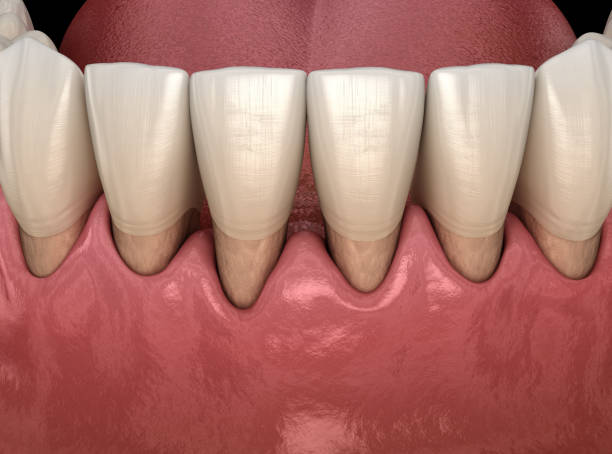
Gum Recession
Gum recession is the complex process where the margin of the gum tissue surrounding the teeth pulls back and exposes more to tooth roots and pockets or gaps. It further displaces the formation between the teeth and gum line. Tiny holes between gums and teeth attract harmful disease-causing bacteria to build up.
Untreated receding gums may severely damage gum tissues and teeth bone structures. It further results in tooth loss consequences. Kamol oral care developed the Best Oral Rinse Medicine For Receding Gums.
Causes
A number of factors are responsible to have painful gum recession including:
Periodontal diseases: Gum disease is the root cause of gum recession. It is a bacterial gum infection destroying gums and supporting teeth.
Genetics: Some people are at higher risk to have gum recession disease. As per studies approx 30% of people are at risk to have gum disease, despite taking good care of their teeth.
Hard Brushing: Aggressive or hard brushing causes tooth enamel to pull back or wear aways and prompts your gums to recede. It is advised to brush your teeth gently and use electric brushing if possible.
Tobacco Products: Chainsmokers or tobacco chewers are more likely to have gum recession disease. A hard substance called Plaque develops inside your mouth causing gums to recede.
Cavities
The mouth cavity is a general oral condition, where the hard surface area of your teeth develops tiny holes. Cavities are also described as tooth decay or caries. Mouth bacteria, snacking, having sugary drinks, and not cleaning your teeth well are responsible for tooth decay.
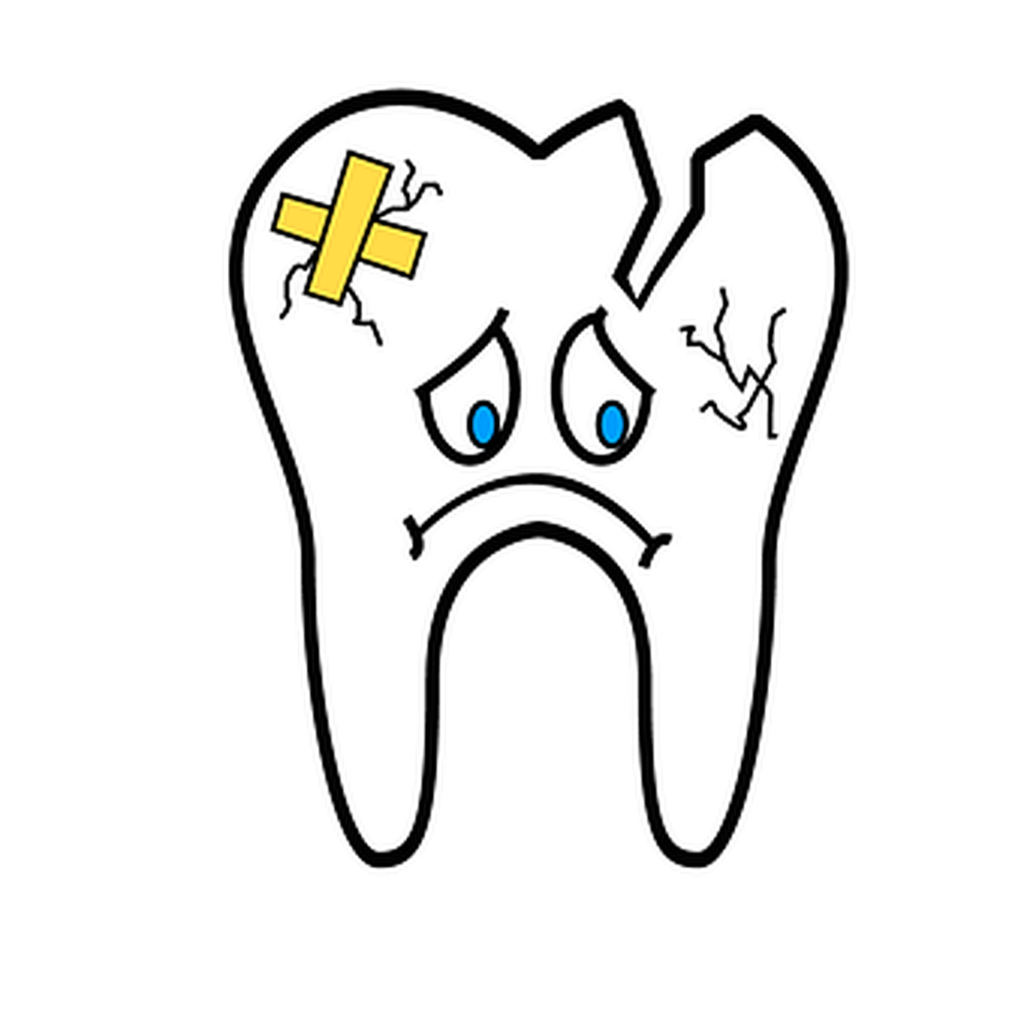
Older adults, children, and teenagers are more vulnerable to have cavities. Use The Best Oral Rinse Medicine For Cavities. The medicine is the genuine prevention for cavities.
In case cavities remain untreated, they largely affect the deeper layers of your teeth. It further results in toothache, infection, and tooth loss. Regular dental visits and good habits of teeth
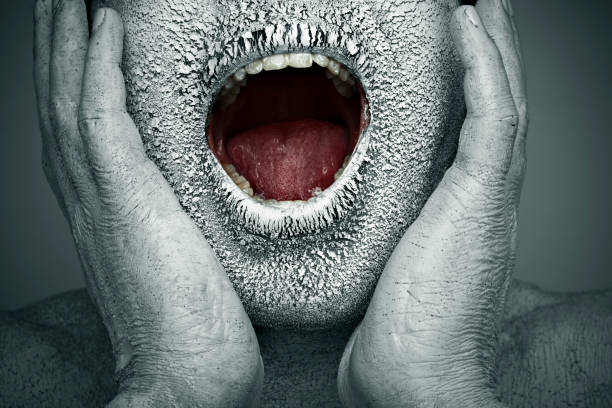
Dry Mouth
Dry mouth refers to a medical condition where the Salivary glands inside your mouth don’t produce enough saliva to keep your mouth wet. It is also known as Xerostomia. Saliva is a crucial part of your digestive system. It is useful to digest food and drinks and helpful to flush your mouth to remove tiny food particles stuck in your teeth.
The scarcity of Saliva makes dry and tight skin in or around your mouth. It causes your lips to be cracked and your tongue feels rough and dry. It makes it tough to eat, talk or swallow.
Causes
A number of factors are directly or indirectly responsible for dry mouth. Some of them are as under:
Side-effects: The risk of dry mouth is genuinely precise by the side effects of certain medications and antibiotic drugs. Unprescribed medicine for the treatment of depression, anxiety, pain, diarrhea, asthma, and urinary discontinuance may put your oral health at risk.
Cancer treatment: Chemotherapy drugs are highly vulnerable and change the nature of Saliva and its production. Head and neck Radiation treatment may affect salivary glands which results in a sharp drop down in saliva production.
Aging: Older adults often experience dry mouth because of their age. People above 60 years experience changes in the body’s ability to handle medication, nutrition deficiency, and are affected with long-lasting health problems.
Nerve Injury: An injury that causes nerve damage in your head or neck area may affect you with dry mouth problems.
Consumption of Tobacco or Alcohol: People are in habit of alcohol consumption, smoking, and chewing tobacco or pan masala can increase dry mouth symptoms.
Treatment
Kamol Medi Healthcare developed Oral Rinse Medicine For Dry Mouth for its successful diagnosis. The medicine is fruitful to repair secretory units of salivary glands responsible to produce enough saliva to keep your mouth wet.
Red Spots
Red spots are generally caused by a virus, fungus, side effects, and bacterial infection. They are frequently spotted on the lips, roof of the mouth, bottom of the mouth, and tongue. Cold sores, Oral herpes, certain food habits, stress, smoking, and cancer treatment are common causes for red spots in the mouth.
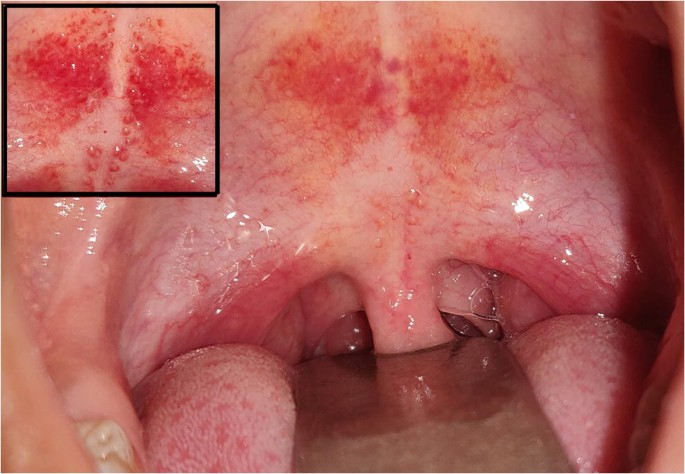
The problem of red spots in the mouth is painful and causes discomfort while eating, drinking, and talking. Red spots are usually asymptomatic and remain unnoticed for a long time period. Despite their presentation, the spots often signal an underlying infection or systemic condition that needs medical follow-up.
Symptoms
Red spots are highly vulnerable and may affect the inner or outer parts of your mouth. Common symptoms of red spots are as under:
- Fever
- Sore throat
- Cough
- Dryness
- Flaking
- Pain
- Runny nose
- Burning
- Blistering
- Itching
Treatment
Oral Rinse medicine is a prescribed medicine for Red Spots in Mouth Treatment. The gentle gargle of oral rinse medicine liquid spray kills harmful bacteria and other factors responsible for causing red spots in the mouth.
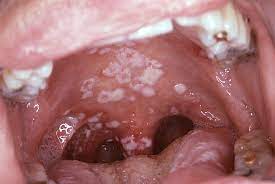
White Spots
White spots are small patches usually found on the gum layers. They may be uncomfortable, thick or hard, and painful depending on nature. Mild white spots affect a limited area of the gum line and can heal on its own, while critical spots need medical attention.
Causes of White Spots
Canker Sores
It is the most common cause of white spots in the mouth. Initially red bumps originate and turn into white or yellow spots over a period of time. Canker sore causes stinging pain and makes it difficult to eat and drink.
Oral Thrush
Oral thrush is another common factor causing white spots. Oral thrush is a condition in which the Candida fungus accumulates the affected areas of your mouth. It further causes white or yellow lesions on the tongue, roof of the mouth, gums, lips, and inner cheeks. The process is comparatively slow and may result in soreness or minor bleeding.
Leukoplakia
It is a normal oral condition, where small patches appear on the gums, roof & bottom of the mouth, tongue, and inner cheeks. The white patches of Leukoplakia may be thicker or harder over the passage of time and can’t be removed.
Symptoms of white spots
We have indicated a number of factors responsible for white spots in the mouth. Some of them are as under:
- Gum recession
- Sore throat
- Tongue soreness
- Bad breath
- Red lesions
- Over shaped sores
- Bleeding gums
- Sores with pus
- White or yellow center mouth ulcers
Treatment
Kamol oral rinse medicine is equally important for White Spots in Mouth Treatment. The medicine contains CHAMAZULENE, ALPHA-BISABOLOL, and LUTEOLIN useful for successful white spot diagnosis.
Oral Thrush
The problem of Oral Thrush occurs with the development of yeast infection inside your mouth. It results in white or yellow bumps forming on the inner cheeks and tongue. Those bumps can be successfully treated with treatment. It is also referred to as oral candidiasis. Anyone can have oral thrush, but it is generally found in babies, toddlers, older adults, and people with weak immune systems.
The infection of oral thrush is mild and sparsely causes serious implications. The problem of oral thrush may appear after radiotherapy to the head or neck and common in people who wear dentures or have diabetes. The infection can be found in your mouth or other parts of the body. Oral thrush causes diaper rash in infants or vaginal yeast infection in women.
Symptoms
The symptoms of oral thrush are not visible at an early stage, but as the infection gets worse the symptoms may be like:
- White or yellow bumps on inner cheeks, tongue, gums, or lips.
- Slight bleeding on scraped bumps
- Mouth soreness or burning sensation
- Mouth corners are dry and cracked
- Difficulty in eating, drinking, or swallowing
- A bad taste or loss of taste in the mouth
Treatment
The infection can be successfully cured by the Medicine of Oral Thrush. Kamol Medi Healthcare developed an Oral rinse medicine that contains rare natural herbs to deal with vulnerable yeast infection causing the infection.
Limited Mouth Opening
Reduced mouth opening is a critical oral condition and deeply affects your daily eating, drinking, and swallowing activities. Trismus also referred to as lockjaw is responsible for blocking the chewing muscles of the jaw, preventing the mouth from fully opening. It may also arise as a result of trauma in jaw, head or neck radiation treatment for cancer, oral surgery, cancer, and infection.
When mouth opening movement is limited, a number of problems can arise. These include feeding and swallowing problems, oral hygiene issues, and even difficulty in speaking. A person can have trismus causing reduced mouth, when he is unable to open mouth more than 35 millimeters (MM).
Maximum cases of Trismus are temporary and treated within a period of 2 weeks, while some are permanent.
Causes
Trauma
Jaw injury or damage can have trismus. Fractured jaw bones or tissue damage are the clear cut examples of trauma that lead to dental surgery. It also includes Bruise of the temporomandibular joint (TMJ), hematoma, and muscles mastication injury.
Inflammation
The problem of trismus also arises because of some medical conditions causing inflammation. Such as Pericoronitis is an example of inflammation affecting soft tissues around the tooth causing impacted molar.
Dental surgery
The problem of trismus may arise after the oral surgery or on post extraction of lower wisdom teeth. The procedure of oral surgery creates inflammation or hyperextension to the jaw causing trismus.
Infection
The following types of infection can contribute to trismus in some cases.
- Tetanus
- Mumps
- Tonsillitis
- Peritonsillar abscess
- Other types of abscess
Cancer treatment
The function of the jaw may be severely affected by the cancerous tumors in the head or throat. Radiation treatment of the head or jaw causes trismus to erupt.
According to a study with 50 participants consisting of cancer, trismus affected 56.7% of them at the time of treatment.
The numbers increased from 86.4% to 87.5% after surgery and radiotherapy respectively.
Symptoms
The symptoms of reduced mouth opening are as under:
- Pain in jaw, even without movement
- Difficulty in performing brushing, flossing, and wide opening of mouth
- Jaw cramping
- Discomfort in chewing or swallowing certain foods
- Headache or Earache
Treatment
With enhanced eruption of limited mouth opening cases, Kamol Medi Healthcare developed Oral Rinse Medicine For Mouth Opening Problem. The drug is useful to normalise jaw muscles with regular doses of oral rinse liquid spray. It is helpful to soften restricted jaw muscles to open reduced mouth effectively.
Bad Breath
Bad breath also referred to as Halitosis, can turn out as a result of poor oral hygiene. The condition of bad breath may worsen by the types of food you eat and other unhealthy lifestyle habits.
Impact of food affecting your breath
All food items that are eaten begin to be broken down in your mouth. The food particles are being absorbed by your bloodstream and move to your lungs affecting your breath while exhalation. Food items with strong odors such as garlic or onion may significantly affect your breath. The odor will go away after the foods have passed through your body.
The following foods may also affect your breath including:
- Cheese
- Alcohol
- Certain spices
- Pastrami
- Orange juice
- Soda
- Citrus fruits
- Protein
- Canned fish
- Horseradish
Causes
There are many possible causes of bad mouth breath, some of them are as follows.
Food: The tiny food particles stuck in and around your teeth may erupt harmful bacteria to build up causing a foul odor. Eating certain foods with strong odor such as garlic, onion, and spices is also responsible for bad breath. The digested food enters your bloodstream and carries to your lungs affecting your breath while exhaling.
Tobacco products: Regular tobacco or pan masala users are more likely to have gum disease causing bad breath. While smoking has its own unpleasant mouth odor.
Dry mouth: Saliva helps to keep your mouth wet and flush your mouth to remove food particles causing bad breath. The scarcity of Saliva production keeps your mouth dry leading to bad breath problems.
Poor oral hygiene: The habit of not brushing or flossing keeps food particles from residing in your mouth. It further produces a colorless sticky substance called Plaque forms on your teeth. Plaque can affect your gums and forms plaque-filled pockets between your teeth and gums causing periodontitis.
Drugs: Certain drugs directly or indirectly affect dry mouth leading to bad breath. Consult with your doctor while having medication for a specific disease.
Treatment
Use Kamol Oral Rinse Medicine For Bad Breath to get rid of mouth’s unpleasant breath. The medicine is effective to kill harmful mouth bacteria, remove stinky mouth layers, and flush stuck food particles. It is an efficient alternative to replace bad breath by pleasant breath instantly.


